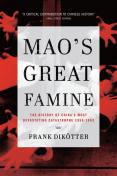BKMT READING GUIDES
Mao's Great Famine: The History of China's Most Devastating Catastrophe, 1958-1962
by Frank Dikötter
Paperback : 448 pages
0 club reading this now
0 members have read this book
"Between 1958 and 1962, China descended into hell. Mao Zedong threw his country into a frenzy with the Great Leap Forward, an attempt to catch up to and overtake Britain in less than 15 years The experiment ended in the greatest catastrophe the country had ever known, destroying tens of ...
Introduction
"Between 1958 and 1962, China descended into hell. Mao Zedong threw his country into a frenzy with the Great Leap Forward, an attempt to catch up to and overtake Britain in less than 15 years The experiment ended in the greatest catastrophe the country had ever known, destroying tens of millions of lives." So opens Frank Dikötter's riveting, magnificently detailed chronicle of an era in Chinese history much speculated about but never before fully documented because access to Communist Party archives has long been restricted to all but the most trusted historians. A new archive law has opened up thousands of central and provincial documents that "fundamentally change the way one can study the Maoist era." Dikötter makes clear, as nobody has before, that far from being the program that would lift the country among the world's superpowers and prove the power of Communism, as Mao imagined, the Great Leap Forward transformed the country in the other direction. It became the site not only of "one of the most deadly mass killings of human history,"--at least 45 million people were worked, starved, or beaten to death--but also of "the greatest demolition of real estate in human history," as up to one-third of all housing was turned into rubble). The experiment was a catastrophe for the natural world as well, as the land was savaged in the maniacal pursuit of steel and other industrial accomplishments. In a powerful mesghing of exhaustive research in Chinese archives and narrative drive, Dikötter for the first time links up what happened in the corridors of power-the vicious backstabbing and bullying tactics that took place among party leaders-with the everyday experiences of ordinary people, giving voice to the dead and disenfranchised. His magisterial account recasts the history of the People's Republic of China.
Editorial Review
Product Descriptionâ??Between 1958 and 1962, China descended into hell. Mao Zedong threw his country into a frenzy with the Great Leap Forward, an attempt to catch up to and overtake Britain in less than 15 years The experiment ended in the greatest catastrophe the country had ever known, destroying tens of millions of lives." So opens Frank Dikötter's riveting, magnificently detailed chronicle of an era in Chinese history much speculated about but never before fully documented because access to Communist Party archives has long been restricted to all but the most trusted historians. A new archive law has opened up thousands of central and provincial documents that "fundamentally change the way one can study the Maoist era." Dikötter makes clear, as nobody has before, that far from being the program that would lift the country among the world's superpowers and prove the power of Communism, as Mao imagined, the Great Leap Forward transformed the country in the other direction. It became the site not only of "one of the most deadly mass killings of human history,"--at least 45 million people were worked, starved, or beaten to death--but also of "the greatest demolition of real estate in human history," as up to one-third of all housing was turned into rubble.
A Look Inside Maoâ??s Great Famine: The History of China's Most Devastating Catastrophe, 1958-1962
(Click on Images to Enlarge)
 |  |  |
| Autumn 1955â??Spring 1956: Mao, displeased with the slow pace of economic development, pushes for huge increases in the production of grain, cotton, coal and steel. | November 1957: Mao visits Moscow. Impressed by the Soviet sputnik, the first satellite launched into orbit, he declares that the â??East wind will prevail over the West windâ??. | Summer 1958: Farm collectives are amalgamated into gigantic peopleâ??s communes of up to 20,000 households. Famine conditions appear in many parts of the country. |
Discussion Questions
No discussion questions at this time.Book Club Recommendations
Recommended to book clubs by 0 of 0 members.
Book Club HQ to over 88,000+ book clubs and ready to welcome yours.
Get free weekly updates on top club picks, book giveaways, author events and more








